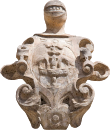
Back Музаки (род) Bulgarian Muzaka German Οικογένεια Μουζάκα Greek Famille Muzaka French Muzaka Italian Huis Muzaka Dutch Музака (род) Russian Muzakajt Albanian Muzaka Swedish Muzaka ailesi Turkish
| Muzaka Muzakajt | |
|---|---|
| Noble family | |
 The Muzaka coat of arms is found in bas-relief on the residence wall of Palazzo Argentina, Francavilla Fontana, first mentioned by Rosario Jurlaro in his work "I Musachi despoti d'Epiro: in Puglia a salvamento". | |
| Country | Medieval Albania |
| Current region | Myzeqe |
| Place of origin | Lekas (present-day southeastern Albania) |
| Founded | 13th century |
| Members | |
| Connected families | Zenevisi |
The Muzaka were a noble Albanian family that ruled over the region of Myzeqe (southern Albania) in the Late Middle Ages. The Muzaka are also referred to by some authors as a tribe or a clan.[4][1] The earliest historical document that mentions the Muzaka family (around 1090) is written by the Byzantine historian Anna Komnene. At the end of the 13th and beginning of the 14th century members of the Muzaka family controlled a region between the rivers of Devoll and Vjosë. Some of them were loyal to the Byzantine Empire while some of them allied with Charles of Anjou who gave them (and some other members of Albanian nobility) impressive Byzantine-like titles (such as Sebastokrator) in order to subdue them more easily. In the 1340s, Stefan Dušan pressed further south into Albania, and by 1343-45 had taken central towns and territories in southern Albania, including domains of the Muzaka family. However, they would fall back under local control after his death in 1355. After the Battle of Savra in 1385 the territory of Albania came under the Ottoman Empire; they served the Ottomans until 1444 when Theodor Corona Musachi joined Skanderbeg's rebellion. When the Ottomans suppressed Skanderbeg's rebellion and captured the territory of Venetian Albania in the 15th century many members of the Muzaka family retreated to Italy. Those who stayed in Ottoman Albania lost their feudal rights, some converted to Islam and achieved high ranks in the Ottoman military and administrative hierarchy.
Notable members of the family include Andrea II Muzaka, Gjon Muzaka, Theodor Corona Musachi and Andrea I Muzaka, among others. The last notable member of Muzaka family who found refugee in Italy died in Naples in 1600.
- ^ a b c Fine 1994, p. 290.
- ^ Cite error: The named reference
D-1was invoked but never defined (see the help page). - ^ a b Heide Brigitte Buschhausen; Helmut Buschhausen (1976). Die Marienkirche von Apollonia in Albanien: Byzantiner, Normannen u. Serben im Kampf um die Via Egnatia. Verlag d. Österr. Akad. d. Wiss. p. 26. ISBN 978-3-7001-0122-2.
Adelsfamilie Musachi (Musac, Musacus)
- ^ Hasan Celâl Güzel; Cem Oğuz; Osman Karatay; Murat Ocak (2002). The Turks: Ottomans (2 v. ). Yeni Türkiye. p. 2v. ISBN 9789756782583.
Albanian tribes such as Bua, Muzaka ... Kostandin Muzaka
© MMXXIII Rich X Search. We shall prevail. All rights reserved. Rich X Search